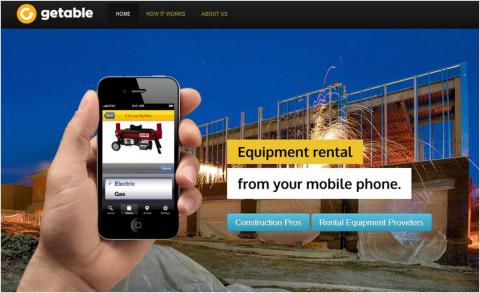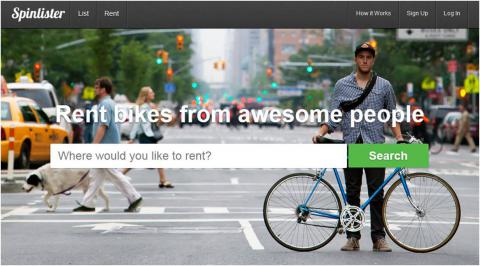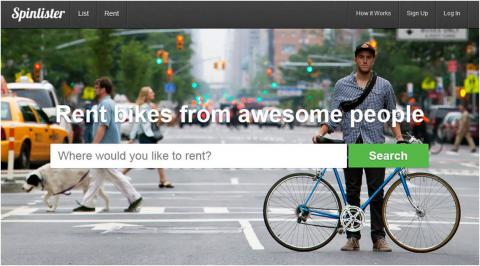I was first drawn into the rental economy as a broke and car-less college student. Through my University, I received a free code for a year-long membership of Zipcar’s carsharing service. Now, six years later I am still using Zipcar but I have branched out to other car rental services like RelayRides for additional vehicle choices. I am also using Airbnb to find lodging, Netflix to watch movies, and Spinlister to find bicycles. In college, I simply couldn’t afford to buy a car, stay in a hotel, or own 100 DVDs so the rental option was an economic necessity. Now as a yuppie in Boston, I’m certainly less thrifty but with thousands of dollars in student debt I’ve really bought into the idea of “access over ownership”. This is where the Rental Economy 2.0 comes in.

The Rental Economy 2.0
This new era in the rental industry is defined by the use of social networks and mobile technology to decentralize and ultimately improve access to common consumer goods. This matching of our real-time, online world with our tangible goods in real life is making it easier than ever to rent.
So far in my year of the Sharing Economy, I have spent a lot of time trying to understand what services exist and which ones could apply to my own life. After doing some initial research, I quickly became overwhelmed with just the number of carsharing companies that existed (73 that I found globally). This was going to be a long process so I enlisted the help of a TaskRabbit named Maria. She helped me to identify over 320 companies in the “sharing-space” and categorize them into different industry segments. Collectively, we found 138 companies that were specific to Rental Economy 2.0. Carsharing was easily the largest segment (53%) while the rest (47%) was extremely varied, ranging from books, to housing, to fashion, to media and more.
Renting Broad and Shallow or Narrow and Deep
The most immediate trend I noticed was that there were two types of companies, those that rented everything and those that focused on renting specific niche items. I found that I prefer the narrow and deep companies because you’ll have a better chance of finding what you need. I don’t often shop for dresses, but I know that Girl Meets Dress is a company that rents out designer dresses. With over 4,000 dresses, they are a leading online luxury dress rental company. So if I needed to rent a dress, I’d go there, no problem. Their offering is clear and focused.
Additionally, if I needed construction equipment, I’d go to Getable, a company that was started by a Tufts Graduate (Go Jumbos!) and focuses specifically on the needs of residential and commercial construction. Due to their focus, it is very easy to gain access to the specific item that you need.

Alternatively, there are websites that allow you to rent anything and everything. I found these sites to be very difficult to use. I found a generator on one site, but it was in Anchorage, Alaska (I live in Boston). On another site, I found three power drills but they were hours away in western Massachusetts. In both cases, these sites were too diverse to really offer me any benefit. One “rent-everything” site that I might consider using in the future is Share Some Sugar. They allow you to rent anything, but they focus on the peer connections that are necessary to share locally. The site is also very easy to navigate.
Another service I would consider is Frents. They rent everything from cars to Blu Ray players to baby toys. After browsing their website, I was pleased with how clean and well-designed it was but I’m still skeptical that its variety is really a benefit to me. From what I’ve seen, I doubt they’ll have what I want, where and when I want it which is a hallmark of other sharing services like Zipcar.
Peer-to-Peer versus Business-to-Consumer
There is another important distinction between the companies in the Rental Economy 2.0 and it’s the difference between peer-to-peer marketplaces and business-to-consumer marketplaces. Both business models fulfill the “access over ownership” mantra of the sharing economy but many would argue that removing peer interactions makes the service purely a “Transactional Economy” instead of a “Sharing Economy”.
In the housing rental market, two good examples are HomeExchange and Rent Mine Online. Home Exchange is a peer-to-peer marketplace where homeowners can swap housing during vacations. There is a substantial vetting process between homeowners because you don’t want just anyone to stay in your home for weeks or months on end while you’re not there. Rent Mine Online on the other hand (now called LeaseStar) helps apartment management companies increase referrals through the power of social media. They are certainly a business-to-consumer service, but they have the aesthetic and feel of many Sharing Economy companies.
Many other examples exist like the popular Netflix and the less popular SwapaDVD for movie rentals. For me, the decision ultimately comes down to what services improve my “access over ownership”. I prefer the peer-to-peer networks, but there is a certain convenience threshold where I’ll start using a business-to-consumer service without a second thought.
Opportunities in the Rental Economy 2.0
As an always-enterprising guy, I find myself constantly looking for opportunity. In terms of the Rental Economy 2.0, I see a huge opportunity for men’s fashion, think of a Netflix for ties, watches, or even dress shirts. There are more than a dozen sites for women’s fashion, many with revenue in the millions. I haven’t yet seen anything for men yet.
Personally, I’m not terribly interested in the fashion industry. However, what I am very interested in is the outdoor recreation industry. 50% of my (minimal) possessions are related to outdoor activities. It’s what I think about and do with most of my free time. I only found one company in this space and it’s called Spinlister, a company that allows you to rent bicycles from your peers. You could definitely rent bikes from a traditional bike shop, but this old-school method dictates the where, when, and whom you can rent from. It’s also more expensive. For example, I had a friend spend several hundred dollars to disassemble, package, and haul her bike through several airports to New Zealand for a race. Once she arrived, she had to pay someone to have it reassembled. Then wash, rinse and repeat to get it back to Boston. Imagine if she could have just left the bike at home and rented an equivalent bike from a fellow triathlete in New Zealand. This would have saved her hours of hassle, hundreds of dollars, and led to a completely new experience for her.

This got me to thinking. I have an incredible group of outdoorsy friends in the Boston area and we are constantly lending and borrowing outdoor gear from each other. Outdoor recreation activities like camping, kayaking, or biking require large up-front investments of highly specialized equipment. This is a barrier for many people who would like to adventure outside. As an example, I love winter camping but many of my friends lack the requisite gear like a $500 -20F sleeping bag and a $700 winter tent. Some of these items are available for rent at traditional outdoor retailers like REI and EMS but again their offerings are centralized, i.e. you have to go to one of their stores during their open hours in order to rent from them.
As an avid outdoorsman with a passion for new ideas, I have become really excited about what the world of outdoor gear sharing could look like. So, in order to better understand how people use outdoor gear, I’ve developed a two-minute survey. Please take the survey and if I get over 100 responses, I'll share the results in a future post. So please share it on Facebook and Twitter when you're done. Thanks in advance for your input!









